How AI in eCommerce is Changing this Industry in 2026 and Beyond

Artificial intelligence plays a crucial role in eCommerce, changing how businesses carry out their functions and interact with consumers. AI in eCommerce market is the use of complex statistical models, machine learning, and data analysis for personalization, efficiency, and optimization. During the year 2024 and other future years, one can observe that AI technologies remain popular and allow eCommerce firms to remain relevant and relevant for customers. From demand forecasting and chatbots to dynamic pricing and visual search, AI has gradually entered the world of digital commerce.
Thus, the integration of AI in the eCommerce sector has many advantages – improved marketing and advertising, customer loyalty, better automation, sales, management, and inventory. These advancements not only enhance entities’ operational efficiency but also enhance consumer experiences. However, the use of AI in eCommerce has some drawbacks, including data privacy, high implementation costs, and the availability and demand for qualified professionals. In this guide, the various types of AI in eCommerce, the advantages, examples, concerns, and how-to guide on incorporating AI into your eCommerce site will be discussed.
I. Types of Artificial Intelligence in eCommerce
Today, AI in eCommerce is reshaping the industry by offering diverse new technologies that extend the client experiences, as well as improve performance and sales.
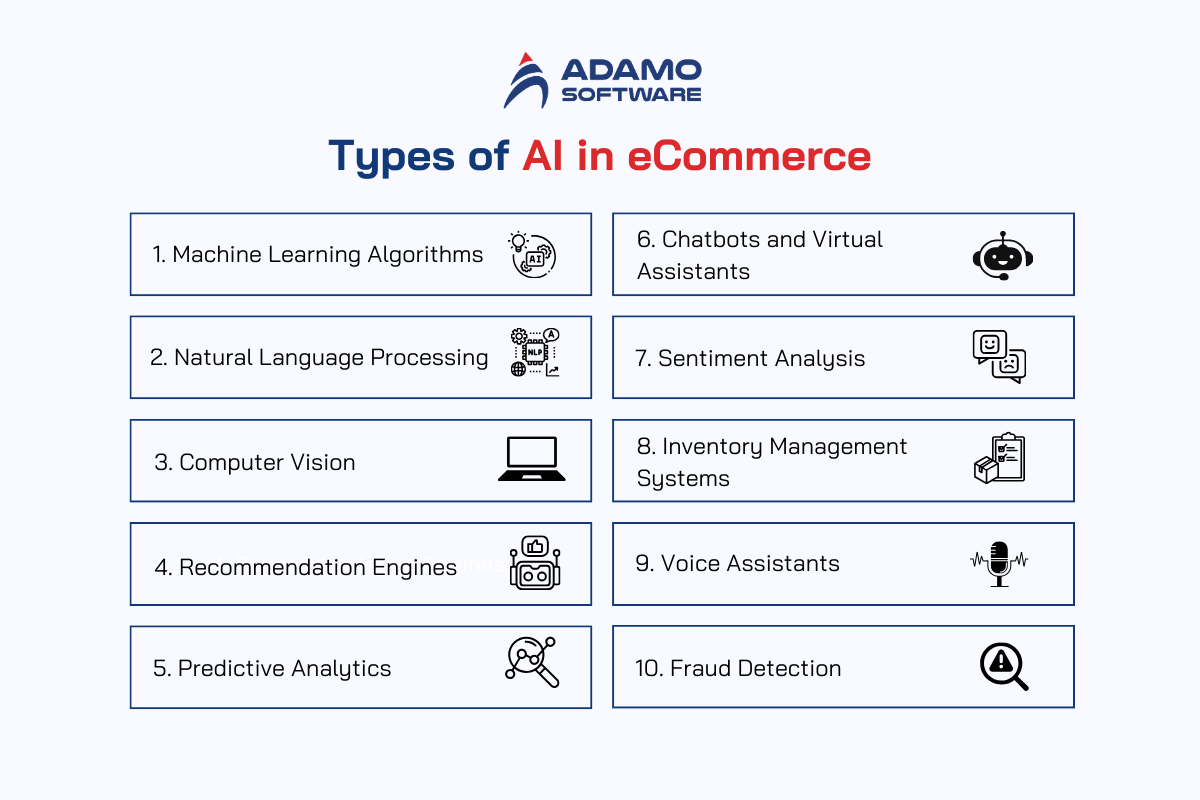
1. Machine Learning Algorithms
It uses computational methods to identify patterns, to make predictions, in data. In eCommerce they use accounts to recommend products, analyze dynamics, and categorize customers. This goes a long way in helping businesses to prepare and position themselves given the trends of the future.
2. Natural Language Processing (NLP)
NLP is an application of Artificial Intelligence that deals with the interaction between humans and computers through natural language. In eCommerce, NLP applies to chatbots and virtual assistants where customers get instant support, queries are solved and communication is smooth. Another area that may benefit from NLP is sentiment analysis, in which businesses are interested in comprehending customer feedback and reviews.
3. Computer Vision
Computer vision takes images and then analyses them so that it can come up with a decision as to what it is dealing with. In eCommerce, it promotes awareness of the product and its location. For instance, it allows customers to upload pictures to look for similar products to buy, enhancing the experience. It is also helpful in issues of quality assurance and monitoring of stocks.
4. Recommendation Engines
Shopping assistants offer related products based on previous purchases and patterns. With the help of collaborative and content-based filtering, these engines help in customizing shopping, encouraging purchasing, and ultimately enhancing customer satisfaction.
5. Predictive Analytics
Predictive analytics involves the application of statistical techniques and forming models of the future using previous events. In eCommerce, it can be used for decision-making as to pricing as well as to manage stock and assess the customers’ behavior. It assists organizations to make the right choices, cut expenses, and increase revenue, thus being a valuable resource.
6. Chatbots and Virtual Assistants
Chatbots and virtual assistants are advanced AI technologies, which entail real-time customer support services. They include a set of instruments that can assist with various procedures such as providing general information or helping the client decide whether to purchase a product. Self-service realizes around-the-clock customer service, enhancement of the perception of service, and a decrease in operating expenses.
7. Sentiment Analysis
It is an AI used to analyze and categorize feelings present in a text corpus. When it comes to eCommerce or businesses, they use sentiment analysis in an evaluation of customer reviews, social media posts, and feedback. This insight gives businesses an outlook on what customers think about the products and services offered to them and thus aids in improving the businesses based on facts.
8. Inventory Management Systems
Automated inventory tracking systems employ artificial intelligence, where machines learn to determine when to restock the inventory, rather than purchasing items in excess or running out of stock. It orders supplies and frequently offers details on the stock which makes the supply chain functional.
9. Voice Assistants
Mobile platforms such as Amazon Echo and Google Home let users search and order products, and seek recommendations using voice. This feature improves access which in turn increases the overall convenience of shopping.
10. Fraud Detection
Another way in which AI is beneficial for eCommerce is in fraud detection. Some of them include the use of Machine learning algorithms to help in the detection of any anomalies in transactions, controlling fraud, and as a result, safeguarding revenues.
Introducing AI to eCommerce is developing the industry. With these AI solutions, commerce experiences enhanced customer satisfaction, better business flow, and potential disadvantages.
II. Benefits of Implementing AI in eCommerce
The adoption of ‘artificial intelligence’ in eCommerce has shown strengths that are revolutionary in terms of increasing the productivity of eCommerce applications and improving consumer satisfaction.
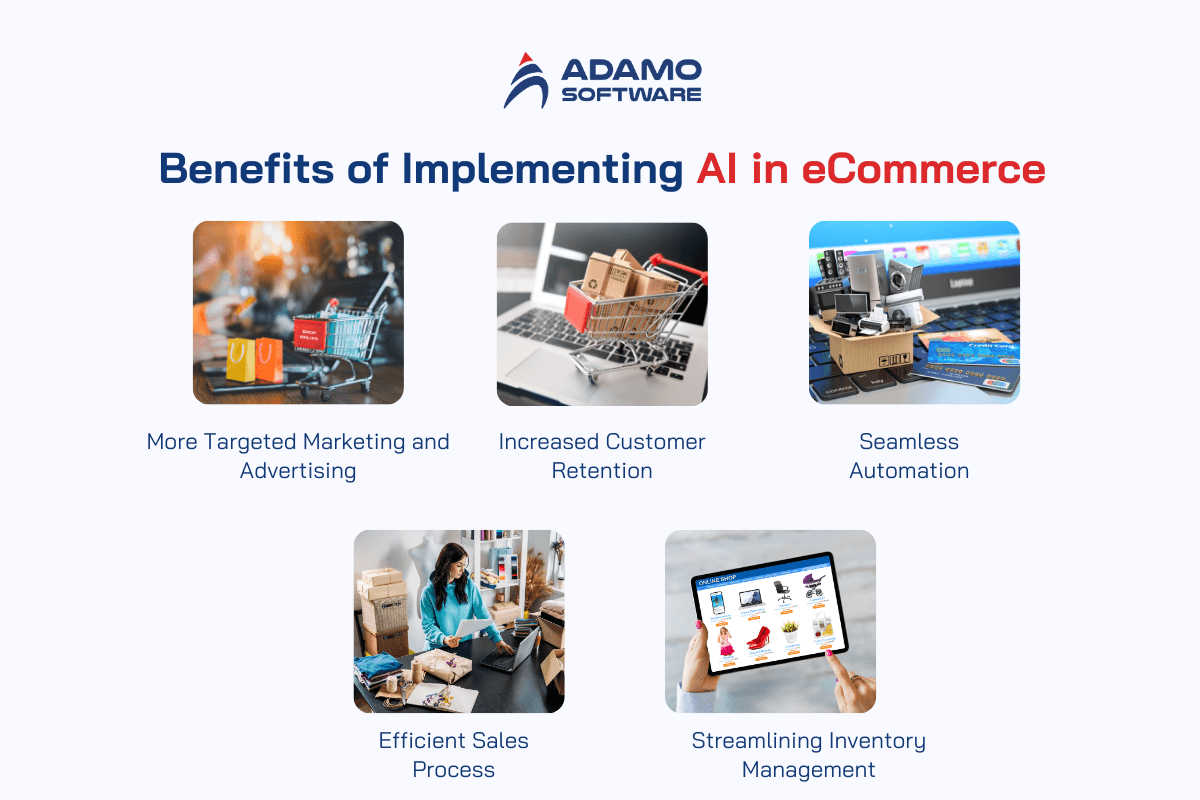
1. More Targeted Marketing and Advertising
AI in eCommerce helps in the accurate targeting of promotional strategies by identifying what a customer views or has purchased earlier. This focused approach increases the conversion efficiency and subsequently the return on investment. For example, the same AI-powered recommendation system that generates around 20% of all sales delivers suggestions based on previous purchases. Further, similar to Facebook, Netflix also employs AI to recommend content that enhances the users’ interaction.
2. Increased Customer Retention
Customer retention is another aspect that benefits from AI in eCommerce through the ability to serve individual customers’ needs and predict service requirements. Tools such as chatbots and virtual companions provide effective solutions to customer complaints. For instance, Sephora’s chatbot can assist with beauty consultations, which improves satisfaction among customers. AI-driven offer personalization can increase the quality of marketing campaigns by 10-30% compared to standard approaches.
3. Seamless Automation
AI in eCommerce is applied to other functions that minimize human involvement in several steps. The administrative aspect of customer support involves chatbots for straightforward questions while complicated matters are handled by human operators. Through AI, forecasting demand is done effectively without overstocking or having a situation where the inventory is depleted. Stock placement is also managed efficiently through AI and overall expenses are reduced.
4. Efficient Sales Process
The work of AI in online shopping is brought to enhance the sales process by utilizing real-time data. Demand forecasts assist in the setting and creation of dynamic pricing strategies, where price changes are determined depending on demand and rivalry. For instance, Zara has incorporated AI to forecast fashion trends and match appropriate inventory. According to McKinsey, margins could rise by as much as 6% when applied to the field of pricing.
5. Streamlining Inventory Management
AI enables automated management of inventory through demand forecasting and stock-on-hand tracking. In this case, stockouts are avoided to ensure that products of a particular brand are always in the market. The giant supermarket chain Walmart employs artificial intelligence for manipulating inventory and inventory control in real-time. AI has the potential to reduce inventory costs by between 20-50% and at the same time enhance the accuracy of stock management by between 20-35%, according to estimates from Grand View Research.
III. AI in eCommerce Examples
The integration of AI in the eCommerce industry has led to changes and practical benefits to the various areas in this market.
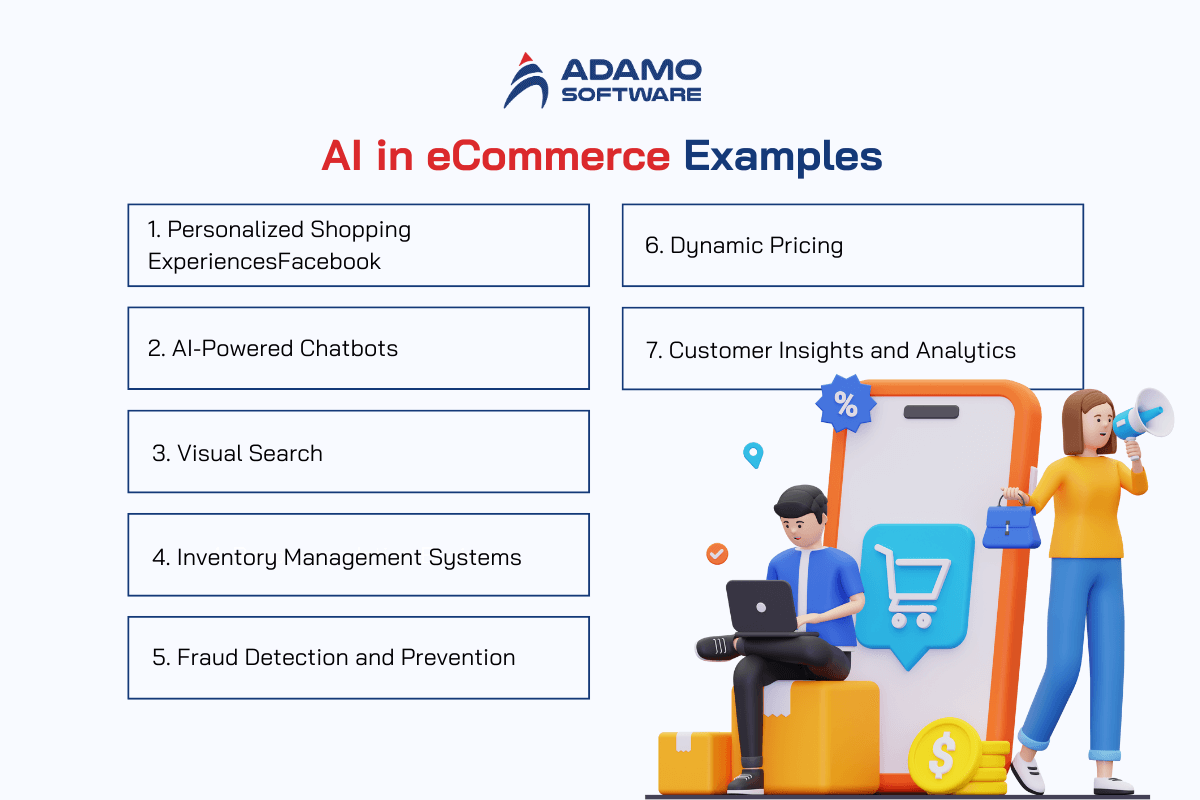
1. Personalized Shopping ExperiencesFacebook
Applying AI in eCommerce leads to an individualized approach to target consumers since the platform can recognize and analyze the patterns of consumers’ purchasing habits. A recommendation system applied on Amazon’s platform helps customers to get relevant products for browsing history and purchase history, improving satisfaction levels and driving revenue.
2. AI-Powered Chatbots
The role of AI chatbots in Case Studies: AI chatbots transform customer service in eCommerce stores to answer questions, help make purchases & process returns. It is significant to highlight that Sephora UK’s FB Messenger chatbot offers beauty consultation and product suggestions to customers, enhancing client interactions and satisfaction. Chatbots are effective in keeping the service going and relieving the human attendant of numerous responsibilities.
3. Visual Search
This is an AI technique that deals with the use of pictures rather than words in a search and it enables customers to make their searches based on the product pictures. One of the unique features implemented in ASOS is a visual search option: the buyer uploads a picture of an item they like, and the program offers identical products from their assortment. This feature impacts user-friendliness by improving the ease of navigation on eCommerce sites.
4. Inventory Management Systems
AI helps in the development of efficient inventory management in e-commerce businesses by considering forecasts of entire demand, observing the stock, and improving the ways of ordering. Another example of AI in Walmart is monitoring real-time supply inventories to minimize wastage and increase stock availability for usage to promote efficiency in operations.
5. Fraud Detection and Prevention
Another aspect of ‘smartness’ that is fixed in AI is that it can track transaction patterns to identify fraud. Another area where AI is currently implemented for real-time purposes in PayPal is to monitor transactions while maintaining the firm’s financial and customer identity integrity against fraudulent activities.
6. Dynamic Pricing
Advanced technology, specifically AI enhances the kind of pricing models that can be used on an eCommerce platform. AI is used by airlines in setting new ticket prices through the process of obtaining more dynamic pricing strategies and generating, as much revenue as they can, while at the same time competing fairly within the industry.
7. Customer Insights and Analytics
Another major benefit of AI is the collection and analysis of strong customer data. Specifically, Starbucks employs AI to monitor customers’ purchasing patterns and habits to support the company’s marketing strategies and individualized customers’ brand interfaces.
IV. Challenges of AI in eCommerce
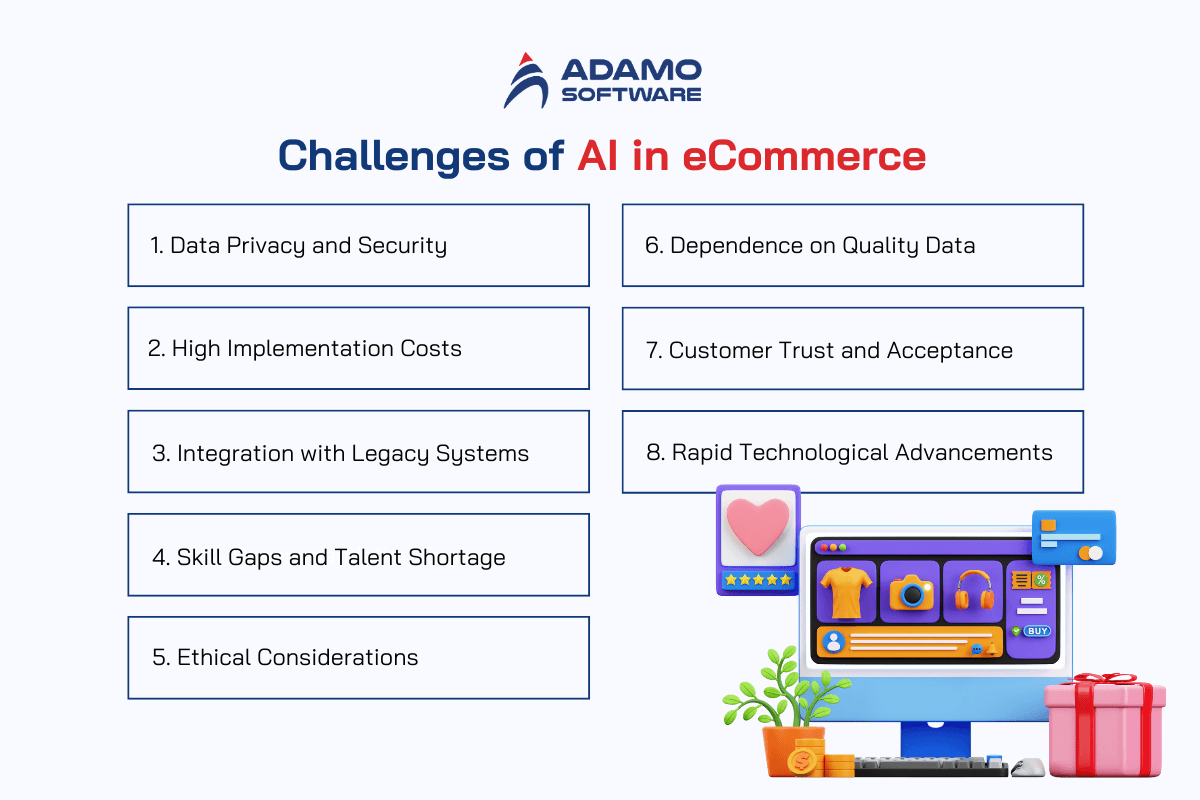
The use of AI in eCommerce sector provides an opportunity and advantage for business since it has pros, but it also has cons that need to be met to optimize the benefits of AI.
1. Data Privacy and Security
One of the main problems of AI in eCommerce is to minimize the risks of leakages and unauthorized access to consumer data. Another concern with AI systems is the potential leakage of customers’ data, as most systems integrate into customer databases to work optimally. Organizations have to employ or put in place measures of protection, which must include following laws such as GDPR to safely hold customers’ data. For instance, giant data leaks like Equifax demonstrate how crucial robust data protection measures are to businesses.
2. High Implementation Costs
In terms of cost, the initial investment in AI technologies is usually expensive, especially for most eCommerce markets. Most AI solutions involve the acquisition of capital-intensive equipment, computing software, and specialized human resources. Arguably, one of the significant barriers to AI implementation is the availability of funds and capital for SMEs, where the companies may not be able to set aside adequate resources for implementing AI. For instance, model training and its incorporation with existing systems may be costly and time-consuming.
3. Integration with Legacy Systems
AI, when incorporated into current enterprise applications, may create significant adaptability issues as current application programs require significant time to be integrated. The problem is that the majority of e-commerce platforms rely on outdated technology, which may not support the latest developments in AI. This integration is a challenge as it entails an overhaul of existing structures, and TEI’s functioning to achieve total harmonization. Companies cannot afford to neglect investments in the modernization of their businesses since it is the only way through which they can effectively capture the full potential that AI has on eCommerce.
4. Skill Gaps and Talent Shortage
AI in eCommerce is possible only if done right, involving a talented staff with knowledge of AI, machine learning, and data science. However, there is a critical skilled manpower deficit in these areas, thus making it hard for organizations to source and attract the right caliber of employees. This skill deficiency Conversely, poses a challenge to the advancement, particularly deployment, of AI solutions. The hiring of new employees and the development of training programs for new AI talents is necessary for companies.
5. Ethical Considerations
The Ethics of AI in eCommerce also entails several issues, of which the following studies have highlighted some fatal problems. Different customer groups are treated unfairly by the bias inherent in AI systems because they reflect bias encoded in the training dataset. For instance, they may award different prices for the same product, or make different recommendations based on a person’s race. Organizations have to ensure their AI solutions are free from bias, or at least they are designed and trained to be as fair as possible.
6. Dependence on Quality Data
Training AI systems requires proper input data, and the quality of data determines the results produced. Inaccurate data regarding correctness, coverage, and potential influx of bias hurts the practicality of the data for predictive analysis for future trends, steering of business processes, and customer satisfaction. The processes of checking, filtering, and revising high-quality data entail the use of many resources consistently.
7. Customer Trust and Acceptance
Another challenge artificial intelligence companies face is the inability to gain customer trust and acceptance. Some potential issues resulting from AI technologies and customer attitudes. The feeling of being unsafe, and a lack of trust in sharing their identity data may be the reason some customers are not comfortable with the technology. The recursive integration of AI in commerce requires clarity of the benefits to the business and the conscientiousness with which customer data is used to make this technology acceptable.
8. Rapid Technological Advancements
AI is still in its infancy; therefore, it requires frequent development of new technologies and techniques. Maintaining such progress and upgrading AI systems is a daunting task, especially for eCommerce firms. To keep abreast of the current and latest developments, advancement in the AI front needs continued reinvestment in more research and development.
V. How to Implement AI into eCommerce Website
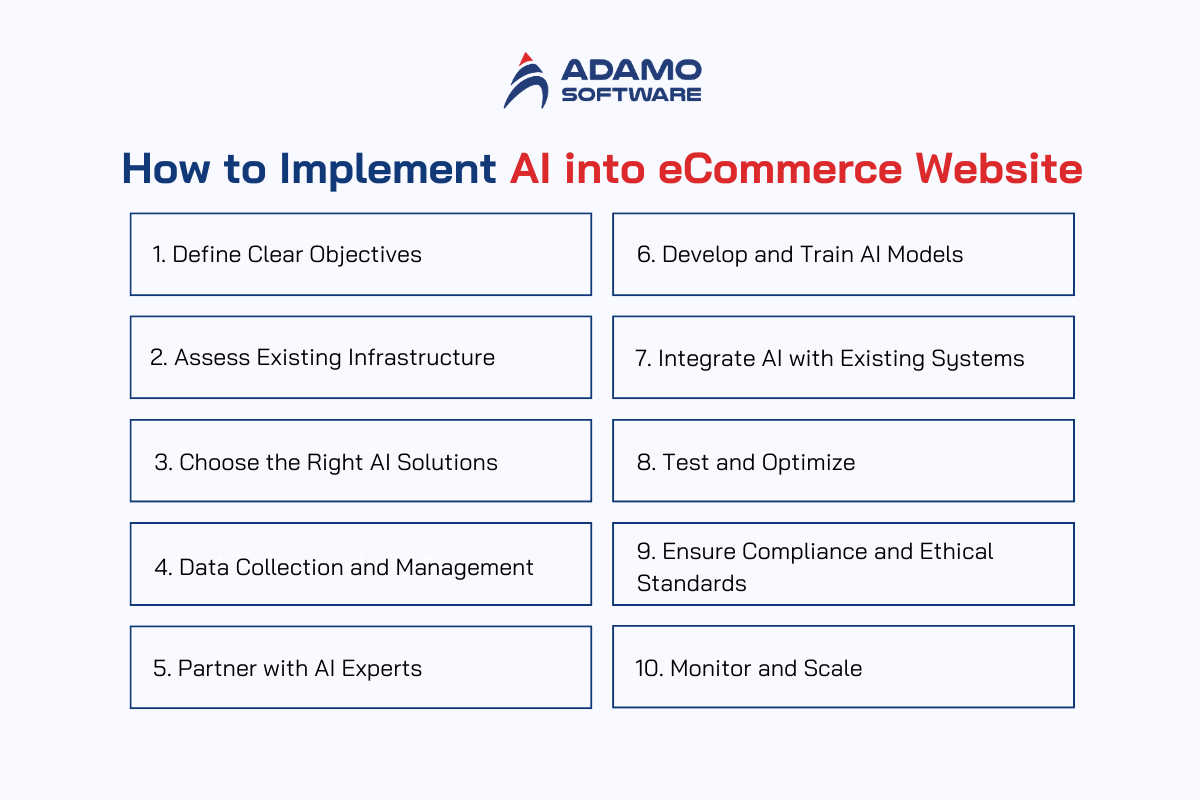
When applying AI in eCommerce processing, it is crucial to implement change systematically to get the most suitable results for the business.
1. Define Clear Objectives
Some common goals involving the use of AI in eCommerce settings include improving customer satisfaction, boosting sales rates, or optimizing ways of handling stocks. It is important to consider that the goals mentioned above give a definite direction and are useful for the assessment of AI usage.
2. Assess Existing Infrastructure
Consider your current eCommerce design to assess where changes can be made to support integration with AI. It involves guaranteeing that your platform can support the workload and demands of AI technologies so that their integration into the system does not entail significant modifications.
3. Choose the Right AI Solutions
Choose AI solutions addressing your business needs; it may include chatbots to optimize a company’s customer service or recommendation systems to maximize the product’s relevance and sales. Applying AI in e commerce requires unique and specific solutions to enhance success.
4. Data Collection and Management
Acquire primary and secondary data such as; consumer transactions, communication, and frequency of site visits. This can be achieved by achieving high levels of data quality and appropriateness to enhance the performance and decision-making capacity of an AI system.
5. Partner with AI Experts
Engage with other specialists in artificial intelligence to ensure that there are no issues that may interfere with the right application of artificial intelligence into the business. Comprehend specifics on how to select tools wisely, how to integrate those into the eCommerce processes, and whom to consult if issues are encountered.
6. Develop and Train AI Models
Gather data and construct machine learning models that will allow for the best decisions and accurate predictions. Provide regular practice to the AI models to make them more competent and sensitive to perform a new task more effectively by reducing the operational time.
7. Integrate AI with Existing Systems
There is no need to migrate to a different e-Commerce platform when implementing AI because the technology works as a solution that interacts with existing platforms via APIs and data transfer protocols. Seek to establish the right combination and integration of multiple systems required to advance the role of AI without impacting organizational operations.
8. Test and Optimize
Testing could entail going through the entire process to highlight any problems affecting the AI system. Collect user feedback to fine-tune the various AI implementations so that they are consistent with the predetermined objectives to augment their efficiency and ensure timely and accurate outcomes in the future.
9. Ensure Compliance and Ethical Standards
Integrate or use AI solutions based on some Data Protection Act laws and ethical standards/regulations. Ensure that when dealing with the customers’ data, this information is clearly stated and not biased, this way the customers put their trust in the eCommerce businesses and the business owners follow the ethics when running their eCommerce businesses.
10. Monitor and Scale
To improve the effectiveness of AI applications, we set up a monitoring system with the use of digital analytics to code KPIs. Implement the knowledge for sufficient AI strategy, integrating AI into numerous areas of business while enhancing the processes through which technology can be leveraged most.
VI. Unlock profit potential with AI in eCommerce with Adamo Software

Collaborate with Adamo, an expert in AI services that are custom-made to meet your business’s requirements. Adamo encompasses every phase of the AI integration process, from concept to placement, guaranteeing that your business entity gains the most out of the Artificial Intelligence possibilities.
Contact us today to discuss more about your eCommerce software development





